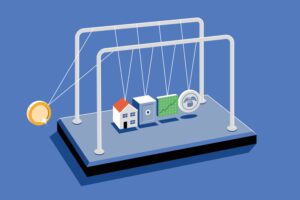In 2025, personal finance challenges in the U.S. are dominated by inflation and rising debt. Americans face higher prices, weighty household borrowing, and economic uncertainty. Are you confident that your personal finance plan is resilient enough to withstand these pressures?
1. Why Inflation Is America’s Personal Finance Wake‑Up Call
First, understand why inflation matters. According to Northwestern Mutual’s 2025 study, 65% of U.S. adults say inflation is the dominant concern affecting their finances this year, and 52% report that their household income is growing slower than inflation.
Also, the Federal Reserve’s latest data shows CPI inflation at about 2.4%, with similar 2.3% PCE inflation—still above the ideal 2% target.
Thus, even modest inflation erodes your purchasing power over time, making everyday expenses higher and retirement savings less effective.
2. How Debt Is Threatening Your Financial Flexibility
Meanwhile, household debt is surging. The New York Fed reports U.S. household debt reached nearly $18.4 trillion, including credit card debt at $1.21 trillion, matching all-time highs.
According to Moneywise, 41% of U.S. adults carry credit card debt and 24% have mortgages. Another survey shows 33% of Americans say they’re struggling or in crisis with money, with 52% living paycheck‑to‑paycheck.
When inflation increases and wages lag, debt becomes more burdensome—forcing many into a dangerous financial spiral.
3. Famous Advice for Enduring Financial Stability
Warren Buffett
Buffett advises that during inflation, invest in skills: personal expertise is inflation‑proof. He also recommends owning businesses with strong pricing power and low capital needs.
Dave Ramsey
Ramsey reminds us:
“Personal finance is only 20% head knowledge. It’s 80% behavior.”
He also says:
“Financial peace isn’t the acquisition of stuff. It’s learning to live on less than you make… you can’t win until you do this.”
Benjamin Franklin / Warren Buffett
“An investment in knowledge always pays the best interest.” — Franklin
“Do not save what is left after spending; instead spend what is left after saving.” — Buffett
These quotes underscore that sustainable personal finance habits—discipline, education, behavior—protect against inflation and debt regardless of economic cycles.
4. Structuring a Future‑Proof 2025 Personal Finance Plan
a) Build an Emergency Fund & Budget Behavior
Start with 3–6 months of living expenses in a high‑yield savings account. Use the 50/30/20 rule: 50% needs, 30% wants, 20% savings/debt repayment
b) Attack High‑Interest Debt Using the Right Method
Focus first on debts like credit cards — average APR is now around 24.3%.
Apply the debt snowball method if it keeps you motivated, or avalanche method if you prefer math efficiency.
NerdWallet surveyed that 35% of Americans set a goal to pay off/down debt in 2025; 25% specifically aimed at credit card debt.
c) Invest Wisely to Outpace Inflation
While inflation hovers above 2%, investing consistently—especially in resilient assets or skill development—helps preserve purchasing power.
d) Diversify Income & Minimize Lifestyle Inflation
Evidence shows that many hourly workers now need side income due to stagnant wages.
Furthermore, small spending leaks reduce long-term wealth (“salary doesn’t make you rich—spending habits do”).
e) Track National Policies That Affect Personal Finance
Keep an eye on macro trends like the “One Big Beautiful Bill Act”, which may expand tax cuts but add trillions in debt.
High national borrowing costs mean future government stimulus or credit access may be strained—directly affecting household borrowing.
5. Stats That Spotlight the Challenge
- 52% of Americans say their income is not keeping up with inflation.
- Household debt now stands at nearly $18.4 trillion, with 4.4% delinquency.
- 41% carry credit card debt, 24% have mortgages, and 33% are in financial crisis.
- CPI inflation is around 2.4%, with PCE at 2.3% in March 2025.

6. Quotes to Reflect On
- “Debt is like any other trap, easy enough to get into, but hard enough to get out of.” — Henry Wheeler Shaw
- “Personal finance is only 20% head knowledge. It’s 80% behavior.” — Dave Ramsey
- “An investment in knowledge always pays the best interest.” — Benjamin Franklin
These emphasize that mastering behavior and mindset is central to weathering economic storms.
FAQs
Q1: Does inflation really reduce the value of savings?
Yes—when inflation outpaces interest on savings, your real purchasing power declines over time.
Q2: Should I prioritize credit cards or student loans?
Target high‑APR debts first (often credit cards, now > 24%). Use snowball or avalanche methods based on what motivates you.
Q3: How much should I invest to beat inflation?
Even modest, consistent investing—especially in index funds or skill-building—can help your net worth outpace inflation over time.
Q4: Can side hustles really help?
Yes—surveys show 10% of Americans started a side job in 2025 to supplement income.nerdwallet.com
Q5: How do national debt trends affect personal planning?
High federal deficits may lead to higher interest rates or reduced government support, affecting borrowing costs and future fiscal stability.
Key Takeaways
- Inflation erodes real income and savings; your plan must outpace it.
- Household and credit card debt is rising; delinquency rates, especially among younger Americans, are climbing.
- Behavior matters: saving, budgeting, wise spending—not just knowledge.
- Prioritize high-interest debt; use structured methods like snowball or avalanche.
- Invest in yourself and resilient assets to maintain purchasing power.
- Diversify income and avoid lifestyle inflation for long-term financial stability.
- Watch economic and policy trends like tax cuts, tariffs, and federal debt—they impact personal finance.
Conclusion
Is your 2025 personal finance plan truly future‑proof? If it doesn’t address inflation, manage debt proactively, prioritize behavior over theory, and adapt to changing economic policies, then not fully. But with the right mindset, strategy, and discipline, you can build resilience—protecting your wallet today and tomorrow.





